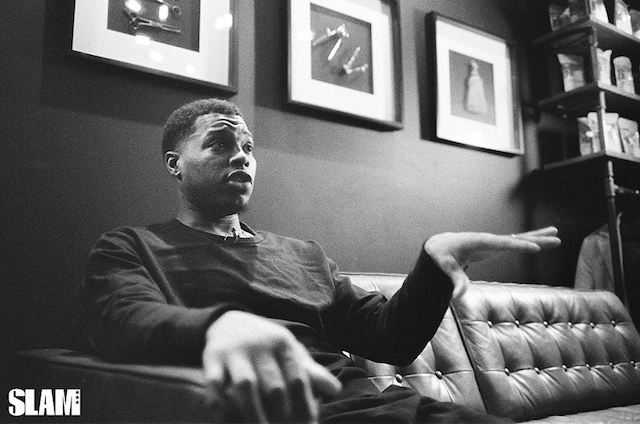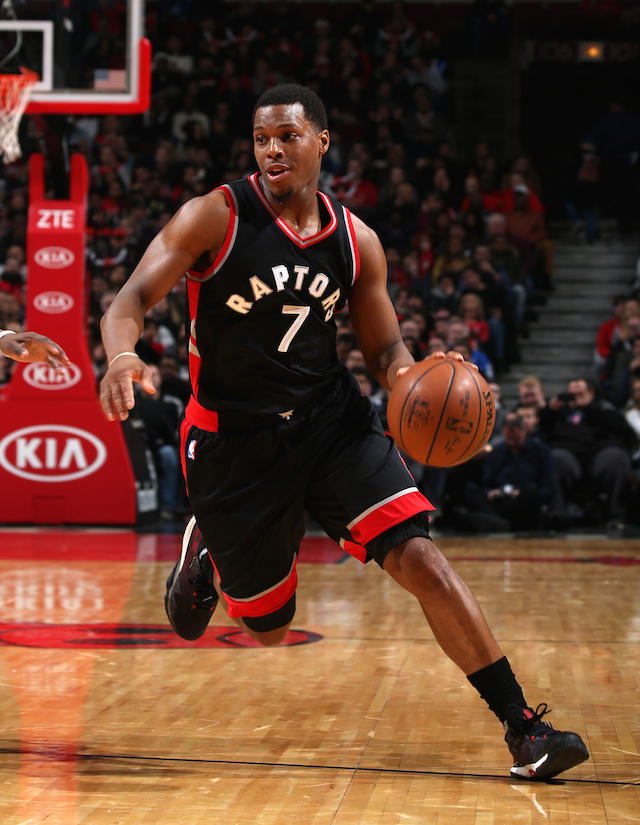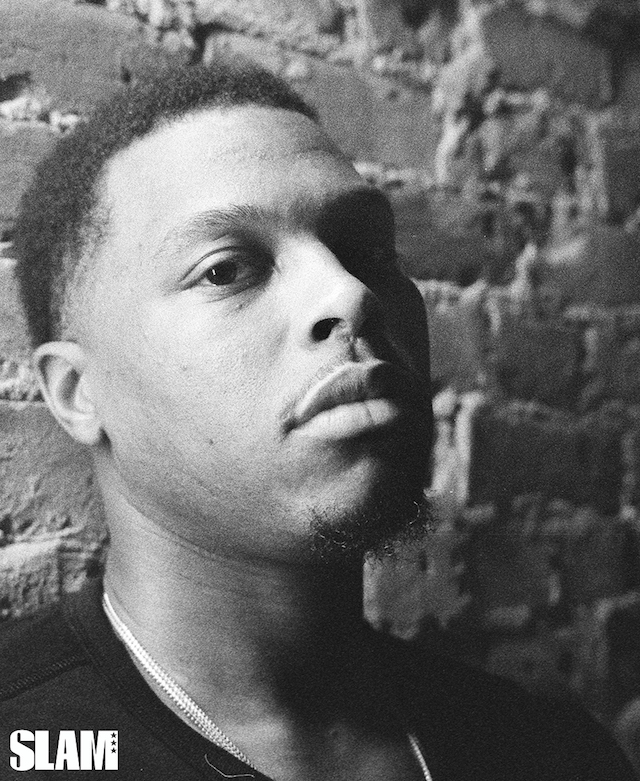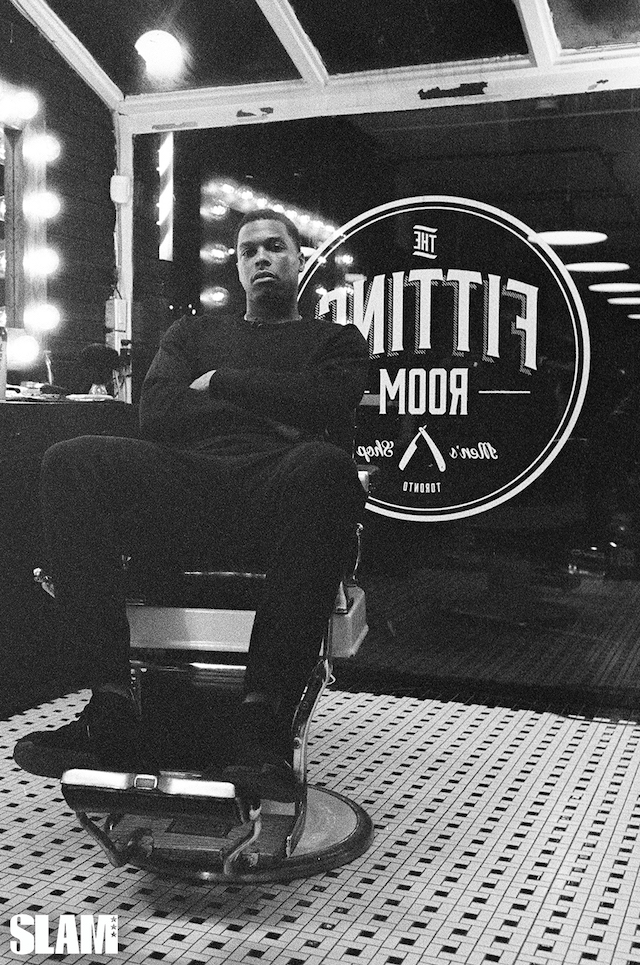Almost 12 years later, Kyle Lowry still cracks a smile when the softball game comes up.
Long before he was an All-Star, a Gold-medal winning Olympian and one half of the NBA’s greatest modern-day bromance with DeMar DeRozan, Lowry was a stocky point guard at Villanova who thrived on a steady diet of pancakes (he’s since changed his ways) and winning.
His coach, Jay Wright, pulled him aside before the basketball team’s annual softball game against coaches and faculty. He told him that part of the tradition is that the players let the coaches win.
You can guess what happened next.
“Oh, we beat their ass,” Lowry says, his smile turning into a laugh. “You weren’t supposed to, but we beat their ass. We. Beat. Their. Ass. I remember that.”
Dressed head to toe in black—sweats and a pair of adidas Yeezy Boost 350 V2s—Lowry is comfortably seated on a caramel-colored leather couch at The Fitting Room, a barbershop with a classic feel in the Dundas West neighborhood of Toronto. The area is woven with Portuguese bakeries, tattoo parlors, corner stores that feel like 30-year throwbacks and hipster bars. On Raptors game nights at one of the bars not too far from here, the ’90s and ’00s hip-hop goes silent and gives way to Lowry and his team lighting up every screen in the place, the volume of the broadcast blasting through speakers—a routinely warm atmosphere on routinely cold winter nights.
Five years in, Toronto feels like home for Lowry. He and his wife, Ayahna Cornish-Lowry, and their two young sons, Karter and Kameron, have built a life here while Kyle has established himself as one of the top PGs in the League.
And yet, he remembers being displeased with the July 2012 deal that sent him from Houston to Toronto.
“I didn’t want the trade to happen because [the Raptors] were going after Steve Nash and I didn’t want to back up for anyone,” he says. “No disrespect, but I was coming off of being a starter. I didn’t know too much about Toronto. I knew it was a cool city from playing here, there was a lot of fans, but I didn’t know too much about the city. That’s five years ago, and now…”
Now, at 30, he’s enjoying a career year, putting up 23 points, 7 assists and 4.8 rebounds per game, guiding a Raptors team that won a franchise-high 56 games last season and reached its first-ever Eastern Conference finals.

After a while, the sun sets as Lowry sits in the barber’s chair at the front window of the shop for our photo shoot. The lights inside make one of the city’s most prominent athletes extremely visible. His eyes shift to his right as he speaks.
“We’ve got people screaming at me,” he says, pointing out a small pack of fans that stop and do a double take through the glass. “[Toronto] is home. It’s a great city, culture, great fans, great restaurants, great people. It’s cold, really cold, but you find ways to stay warm.
“I’m in a place that now, every day it’s something different. It’s an amazing and beautiful city. So diverse, so many different pockets and different areas that you can go into and have fun.”
Dwane Casey didn’t need to hear the conclusion of Lowry’s softball story from Villanova. The Raptors coach has been in Toronto for the entirety of Lowry’s run with the team. He’s watched him become an All-Star, then re-shape his body after being swept out of the playoffs two years ago, leading him into the prime of his career. At the core is that kid at Villanova who couldn’t stomach the idea of handing a game to his opponents.
“He wants to win no matter what it is,” Casey says. “Whether it’s cards, he wants to be the best, and that’s what made him the great player he is, that competitive edge he plays with, that chip on his shoulder.”
DeRozan concurs. Everything is a competition to Lowry, all the time.
“I remember one summer we was playing one-on-one in Las Vegas and it was probably one of the most intense one-on-ones that we had. We was going at it. Battling,” remembers Lowry’s backcourt partner-in-crime and fellow All-Star. “You’d think we was playing for a championship, or money was on the line, you know?
“Whether it’s one-on-one with nobody in the gym or 20,000 people in the gym, to see a person next to you that’s your teammate that has that much competitive nature in them, it’s crazy.”

You can’t credit all of the Raptors’ success over the last few years to any one thing, or player. It’s a combination of team president Masai Ujiri and GM Jeff Weltman’s vision and patience with players and their staff, and commitment to building a culture. It’s drafting wisely and the blessing of DeRozan and Lowry’s friendship translating to on-court trust and chemistry that the rest of the team sees and follows. (And maybe Drake steers an opposing player into a mistake every now and then, too.)
But if you’ve watched enough of the Raptors over the last four seasons, you’ll know that Lowry has been the team’s heartbeat on the court. Forget the end result. Lowry hates losing individual battles, or possessions gone awry. Hates bad calls, hates critics that said he’d never be more than a backup. Lowry wants to win everything, every second of every game.
“I always said the same thing about Gary Payton. If there was a loose ball on the floor Gary’s going to come up with it. Same with Kyle—he’s going to go get it,” Casey says. “That’s who Kyle Lowry is. He’s one of the toughest guys I’ve ever been around and I’ve been around some tough guys. Gary, Kevin Garnett, those guys, he’s right in that level of toughness and not quitting. I’ve never seen the young man stop playing hard for any reason.”
“He’s like a pit bull, he’s always had that, like a chained pit bull. Especially once he gets it going,” DeRozan says.
He’s set the tone all this time in Toronto, but it feels more emphatic this season. Lowry came back from the Olympics comfortably shooting those deep threes that Klay Thompson and Stephen Curry love, and he’s doing it at a better clip than he ever did before. A career 36 percent three-point shooter, he’s hitting at 42 percent this year and is third in the League in made threes per game. He is also third in the League in fourth-quarter scoring, at 7.8 points, and is No. 1 in minutes in the NBA, at 37.7 per game.
Lowry says his success this year comes from DeRozan helping open things up for him, and then playing smart. His feel for the game is completely different than it was five years ago.
“I’m comfortable. I know what I want to do, I know where I want to be, I know what’s going to happen,” he says. “I’m comfortable with Casey, I’m comfortable with JV [Jonas Valanciunas]. I’m comfortable with my teammates, I’m comfortable with DeMar. I’m just comfortable with everything and knowing that things are going to happen the right way. You play hard like we do [and] I think we’re going to be successful.”
Comfort sounds so simple, but it’s so important.

“It’s crazy. Comfort is a big part of basketball,” he says. “Being comfortable in your own skin. People can say this or that about you but if you’re comfortable in your own skin, it doesn’t matter what they say. At all.”
If that sounds vaguely familiar, remember that Lowry grew up tough in north Philly, with Allen Iverson’s take-me-as-I-am attitude on display in front of him from the age of 10 right through his time with the Wildcats.
“He played every night like it was his last,” Lowry says of AI. “I think a lot of people are always adapting to certain situations and changing, but for me, I’m going to be who I’m going to be. I’m going to play hard and give you everything I’ve got. Yes, sometimes it might come off raw, but I’m not doing it maliciously.”
He was a scrawny 6-year-old when he first picked up a basketball, playing in a 12-and-under league. Like so many little kids, he’d use both hands to hoist the ball over his shoulder and chuck it at the hoop. His mother and grandmother took care of Kyle and Lonnie Jr, his brother. Lonnie Sr was never a part of the picture, so his mom worked two jobs. When he opts out of his contract at the end of this season, Lowry could be looking at a new deal in the $200 million range. Perhaps the most shocking part of our interview is the casualness he shows in being able to shrug off the mention of that Powerball-type money.
“It is what it is. I definitely think about it because where you come from, coming from north Philadelphia—the concrete—to being able to have an opportunity to take care of your family and your family’s family for generations,” he says.
Listening to him talk about how good it was to watch DeRozan sign his five-year, $139 million deal last July, and sign it so quickly, going off the market in the opening hours of free agency, you get the feeling that’s what Lowry wants, too. In 2014, Lowry re-signed with the Raptors two days into free agency.
“When it comes to that, you can’t worry about the money. You worry about having fun and winning and I think that’s how you block everything out. If you win…everything, the money comes second. Winning is all that matters,” he says.
“Things will be done accordingly. As long as you play hard and work at it and win games things will take care of itself. Hopefully I don’t have to think about it until June.”

Portraits: Jamal Burger, Videographer: Mark Vallena, Action shot: Getty Images